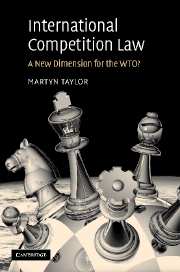Book contents
- Frontmatter
- Contents
- List of tables and figures
- List of abbreviations
- 1 Introduction
- PART I An International Competition Agreement is Desirable
- PART II The WTO Would Provide a Suitable Institutional Vehicle
- 6 Would the WTO provide a suitable institutional vehicle for an international competition agreement?
- 7 Would a WTO competition agreement promote international trade?
- 8 Would competition regulation of trade measures promote competition?
- 9 Should competition principles be introduced into anti-dumping law?
- PART III The Optimal Form for a WTO Competition Agreement
- APPENDIX: Draft negotiating text for a plurilateral WTO competition agreement
- Index
6 - Would the WTO provide a suitable institutional vehicle for an international competition agreement?
Published online by Cambridge University Press: 17 July 2009
- Frontmatter
- Contents
- List of tables and figures
- List of abbreviations
- 1 Introduction
- PART I An International Competition Agreement is Desirable
- PART II The WTO Would Provide a Suitable Institutional Vehicle
- 6 Would the WTO provide a suitable institutional vehicle for an international competition agreement?
- 7 Would a WTO competition agreement promote international trade?
- 8 Would competition regulation of trade measures promote competition?
- 9 Should competition principles be introduced into anti-dumping law?
- PART III The Optimal Form for a WTO Competition Agreement
- APPENDIX: Draft negotiating text for a plurilateral WTO competition agreement
- Index
Summary
The WTO is sometimes described as a ‘free trade’ institution, but that is not entirely accurate. The system does allow tariffs and, in limited circumstances, other forms of protection. More accurately, it is a system of rules dedicated to open, fair and undistorted competition.
(World Trade Organisation Secretariat, 1999)Part II of this book, commencing with Chapter 6, considers whether the WTO would provide a suitable institutional vehicle for an international competition agreement.
Importantly, Chapter 6 of this book does not consider whether the WTO would provide the optimal institutional framework for an international competition agreement. An analysis of whether the WTO would provide the optimal institutional framework is deferred to Chapter 10. Rather, Chapter 6 only considers, the extent to which it would be feasible to incorporate an international competition agreement into the WTO and the likely benefits of doing so.
Chapter 6 has three principal sections:
Section 6.1 identifies the limited historical inclusion of competition law within the GATT, the evolution of the WTO, and various historical initiatives to include competition law within the GATT and the WTO. Section 6.1 identifies aspects of competition law incorporated into the WTO by the Uruguay Round.
Section 6.2 considers the theoretical relationship between international competition law and trade law and establishes the context for assessing proposals to integrate the two disciplines.
Section 6.3 identifies areas of convergence between international competition law and international trade law and proposes a theoretical means to reconcile both laws, based on the concept of market contestability.
- Type
- Chapter
- Information
- International Competition LawA New Dimension for the WTO?, pp. 147 - 184Publisher: Cambridge University PressPrint publication year: 2006



